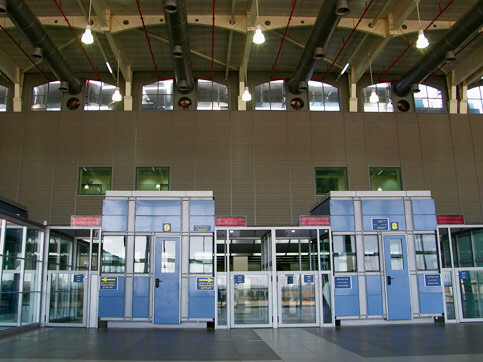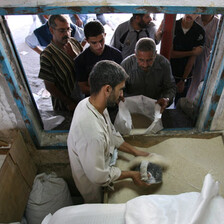
The Israeli-controlled Erez crossing terminal, where most foreigners who wish to enter the Gaza Strip must pass through, August 2007. (Kris Petersen)
If there is a single act that characterizes the plight of the Palestinian people under Israeli occupation, it is waiting: waiting in lines to pass through the hundreds of checkpoints scattered across the West Bank, waiting for Israel to issue an identification card, waiting for permission to travel to the next village or out of the country, waiting for loved ones languishing in Israeli prisons to be released — waiting for peace, waiting for justice.
And for nearly two months, I found myself sharing the experience of waiting — for Israel to allow me into Gaza.
Last year, I spent an extended period of time in Gaza working with the Palestinian Centre for Human Rights (PCHR), helping them to document human rights abuses in the occupied territories. But the abuses I documented then now seem tame in comparison to the recent heights of atrocity Gaza has endured.
Applying for entry into Gaza through the Israeli military authorities is a Kafkaesque and constantly evolving process. One is not allowed to even approach the Erez military checkpoint on the boundary between Gaza and Israel without prior security clearance and already within a year’s time, the application for such clearance had changed dramatically.
Because I had been approved without difficulty in the past, I felt confident that my application would be successful this time as well. The process should have taken no more than five working days, but assuming the situation might be unpredictable, I applied for clearance nearly one month in advance of my arrival in the region. How naive I was.
To my dismay, the Israeli military had not yet reached a decision by the time I flew to Tel Aviv weeks later. The bored, adolescent voices of Israeli soldiers at Erez informed me that there had been no definitive response from security officials and that my application was “still in process.”
Undaunted, I began calling daily — only to receive the same laconic phrase: “still in process.” On more than five occasions, I was instructed to call back later that day, sometimes at a specific hour, and when I did my call inevitably went unanswered. Most often, the response at Erez was nothing more than a friendly hang up, often in mid-conversation. When I was able to pry some information from my friendly military interlocutors, the response was mechanical and scripted:
“Because of the security situation, it is difficult to process applications at this time. Some people have been waiting for months, but try calling tomorrow.”
Apparently Israel was in no mood for quixotic Westerners with a penchant for human rights. But was there any evidence of Israel intentionally prolonging my application process? Looking into the matter, I soon found that I was just one among many human rights and humanitarian workers that have been systematically blocked from entering Gaza by the Israeli military following the invasion.
In early March 2009, the Israeli human rights groups B’Tselem and Hamoked announced that they had petitioned the Israeli high court demanding their staff members be allowed to enter Gaza for the purposes of human rights monitoring. They derided what they called Israel’s “constant foot-dragging” and ultimate “rejection without sufficient explanation.” The two organizations, joined by the US-based group Human Rights Watch, reported late last month that their employees “faced continuous delays from the IDF [Israeli army] unit reviewing the applications.”
As Sarah Leah Whitson, Middle East director of Human Rights Watch, explained, “Israel’s refusal to allow human rights groups access to Gaza raises a strong suspicion that there are things it doesn’t want us to see or the world to know about its military operation there.”
Contacting friends in Gaza, I discovered that scores of human rights workers have been waiting months for a response from Israel. Some of them are now illegally working in Gaza because Israel’s delays have lasted longer than the validity of their original clearance.
For the lucky few that have received any kind of response at all, Israel has apparently instituted a new policy of requiring organizations to be registered with the Israeli Ministry of Social Affairs — a previously unknown requirement and one that is not explained on the official application for security clearance. The process of registering with this governmental ministry is an obstacle that could potentially take months and even then without the guarantee of being permitted to enter Gaza.
Forced to explore other options, my focus turned to the potential of crossing into Gaza via Egypt, Gaza’s frequently sealed backdoor. In the weeks following Israel’s assault, Egypt opened the Rafah crossing point in coordination with Hamas and small groups of humanitarian workers, activists and journalists made their way into Gaza — most notably, British MP George Galloway and American author Alice Walker. But this method is unpredictable; according to a 2005 agreement following Israel’s unilateral disengagement, those who do not hold a Palestinian ID are technically forbidden to cross at Rafah. More significantly, Israel’s continuation of the military siege prevented the crossing from being open for more than 57 days in 2007 and figures are similar for 2008. Although the border has been opened more frequently so far in 2009, Israel typically requires one to exit Gaza the same way one entered, so this raises the very real possibility of being trapped in the coastal territory if the crossing happens to be sealed upon entering. Unfortunately, I was not in a position for this to happen so my only option remained with the Erez checkpoint.
The reality of Israel’s current policy is that by not giving a definitive “no,” it avoids the negative public relations of explicitly denying human rights workers access to the Gaza Strip. By prolonging applications indefinitely, it becomes difficult for activists to accuse Israel of systematically blocking access to Gaza, but this is precisely what they are doing. Israel permits most UN employees to enter Gaza as it does some of the larger international groups like CARE or Amnesty International (not to do so would unnecessarily inflame international tempers), but who will raise a cry over the hundreds of smaller organizations effectively banned from entering a territory Israel claims to have quit?
From the rooftop of my Ramallah hotel I could just barely see Tel Aviv beyond the pastoral West Bank landscape. If I was lucky, I could even catch a glimpse of the sea, shimmering in a kaleidoscopic pink and orange as the sun ritually descends into it. This placid scene was frequently shattered by the screams of Israeli fighter jets, tearing mercilessly across the sky — south towards Gaza — and the feelings of powerlessness became almost too much for me to take.
My heart aches for Gaza: for the fresh sea air and the desert breeze, for the sweet smell of orange groves and the bitterness of unripe pomelo, for the hospitality offered by those who have lost everything but their lives, for my friends suffering indescribable horrors and for the indomitable spirit of a people who refuse to be extinguished in spite of it all. As I catch my flight out of the region, I am acutely conscious of the fact that Israel has scored a minor success by preventing me from entering Gaza. I could not wait there indefinitely. But I know that there are many other ways to fight Israeli oppression. And through it all, Gaza will endure.
Kris Petersen is a graduate student who worked for the Palestinian Center for Human Rights in the Gaza Strip between September 2007-January 2008. He blogs on issues related to Palestine at www.harmonicminor.com and can be contacted at kris@harmonicminor.com.


